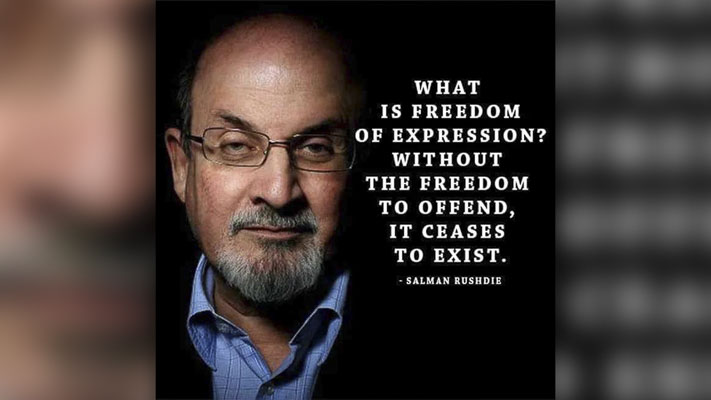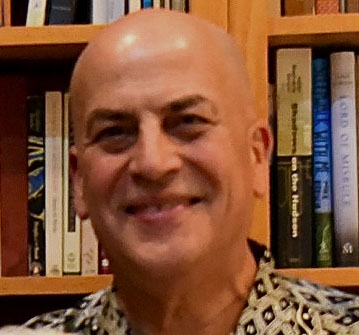
David Marks shares that ‘a better world can only emerge from the crises on our planet with resolute adherence to the highest standards of freedom of expression’
David Marks
Guest author
My mother has attended the Chautauqua Institution’s programs in rural New York state for decades. Every summer, she enthusiastically describes an engaging schedule of enlightening speakers and musical entertainment. This year she phoned so I could listen in on a Sheryl Crow concert — from the same open air venue where novelist Salman Rushdie was stabbed a short time later.

When Rushdie was attacked just before he began to speak in the perennially calm woodlands of Chautauqua, it was another stark reminder of the precarious state of our times. The impact was less about the steady news of unexpected, random violence; but more of a reminder that the challenges to freedom of speech are only intensifying.
My mom, who is approaching one-hundred years, had just departed the peaceful enclave before the incident, but told me that if she had been there, her seat in the front section reserved for the elderly would have put her in full view of the assault. She processed news of the knifing with both shock and thoughtful consideration, as did much of the Chautauqua community. Most people rallied to defend Rushdie and his freedom to write and speak, no matter how much it might offend or anger some people.
In 1989, after Iran’s Ayatollah Khomeini called for Rushdie’s death, the literary world came to the immediate defense of the writer. In solidarity with his plight, many authors, students and others who understood the importance of defending freedom of speech, proudly wore a button simply stating, I am Salman Rushdie. It was a profound and brave response to the call for violence against him — and a recognition that any repression of thoughts and words signals the imminent and dangerous decline of a free society — and must be vigorously opposed.
The original fatwa, the ruling made by the Ayatollah, was responsible not only for this most recent attack, but for the assaults and deaths of Rushdie’s colleagues for over thirty years. The information disseminated condemning Rushdie was presented as irrefutable, but the campaign against him was solely based on deceitful fabrications.
A book that evoked new thoughts was deemed deviant and dangerous. It is unlikely that the angriest of those accepting the call for his execution, including Rushdie’s recent attacker, ever saw a copy of The Satanic Verses; the Ayatollah, according to his son, never read the book. The title actually references the description Mohammed applied to a segment of the Koran. But as with all acts of tyranny, facts don’t matter to the deceitful.
Most readers agree Rushdie’s book is neither derogatory nor blasphemous against the Prophet Mohammed. Certainly, in whatever way the contents are interpreted, a response calling for executing the writer, his editors and publishers, is recognizable as an outrageous violation of human decency, democratic principles and the law. The unwillingness to consider thoughts and words is typical of those who fear information that defies convention.
Rushdie’s words were dangerous to those who oppose independent thinking and insist on strict adherence to dictatorial mandates. People who accepted this repressive, violent solution, did so primarily because they were fooled into thinking Rushdie was a direct threat to them. They were deceived; Rushdie’s words were only perilous for those who sought absolute control.
With the hope that life remains stable, people often reject divergent ideas and blindly trust dictates. A prescribed, familiar authority appears less frightening than the risk of considering new concepts. This inclination towards security is often abused by authoritarian forces to encourage repression, limiting opposition and restricting debate. The Ayatollah’s fatwa was a prime example of this overt abuse of power; igniting anger to retain dominance. However, silencing opposition can be attained in numerous ways, and contemporary applications of this practice reveal similar motivation — although with different techniques.
Governmental repression of knowledge is fueled by a desire to control information; this strategy has become widespread today. All too often a writer’s words are dismissed or belittled because they don’t fit an accepted paradigm or political framework. As governments have greater influence over media, freedom of expression is increasingly threatened everywhere in the world.
An infinite amount of information should be available to those who are interested in new or old ideas. Yet data and writing are filtered or diminished by authorities who deem divergent thoughts, reasonable arguments, and controversial scientific findings as misinformation. Governments, organizations and media often exhibit a willingness to ignore or stifle inspiration that deviates from supporting their beliefs or agendas. Rather than viewing differing political, social or scientific opinions as an opportunity for debate, growth and understanding — words are manipulated by autocrats, gate-keepers and profiteers.
There is no country in the world where authors with brilliant minds and exemplary credentials are not vilified and marginalized, without allowing them any platform. The internet, which at its birth was heralded as the ultimate tool for new ideas to be broadcast without censorship, now openly defies freedom of expression. A web search for the word misinformation, returns countless websites that deem anyone who dares to question government and corporate media’s point of view — as a dangerous threat. These prioritized links are without fair assessment of what actually has been said or written; and are replete with highly questionable assurances from biased fact-checkers — who praise themselves for their objectivity. The battle against free expression and contradictory thought is relentless.
There are sometimes justified limitations on hostile speech or antagonistic writing, as it is reasonable to quell calls for violence. Although when words are simply informative, thought-provoking or even offensive to some, there is no viable reason to limit the fundamental freedom to speak or write.
After being demonized, Rushdie became an advocate for these key liberties, and continues to emphasize their importance, always noting a critical extension; the right to read whatever we choose.
Both raging despots and modern democracies attempt to marginalize those who have reasonable questions about dogmatic pronouncements. But the growing phenomena of group-think mentality and the push for conformity reveals the motivation behind government policy and decisions. The assaults against misinformation are engendered by the self-serving contrivances of leadership.
Authorities demanding compliance and only one way of thinking are focused on dominating information for their own purposes. This mentality was apparent when the Ayatollah issued a fatwa against Rushdie, and it is unmistakably evident today. Contemporary fatwas call for the silencing of dissidents, although we are in an age where overt violence isn’t necessary to repress critics of state policies. Deplatforming those who raise questions or deleting on-line information has become standard practice in attempts to retain absolute power.
Who will defend freedom of speech?
Millions of people remain steadfast defenders of Salman Rushdie’s individuality and his freedom to think, speak, and write independently. This critical response must be extended to all of those who have non-conforming thoughts and words. This also applies equally among these non-conformists, who are obligated to tolerate differing opinions if freedom of speech is to prevail.
A better world can only emerge from the crises on our planet with resolute adherence to the highest standards of freedom of expression. Without a vast majority recognizing this simple truth, the risk of being silenced applies to everyone. We are all Salman Rushdie.
David Marks is an investigative reporter and veteran documentary filmmaker. He has produced a number of films for PBS and the BBC, including Nazi Gold, questioning the neutrality of Switzerland in WWII. His recent book, The Way, is an interpretation of the Chinese classic, the Tao Te Ching, available at LaoTzu-TheWay.org.
Also read:
- Letter: ‘We’re going to give them some money and a plane ticket, and then we’re going to work with them’Camas resident Anna Miller supports a new structured self-deportation policy, calling it a balanced approach to immigration and economic needs.
- Opinion: What the 2025 legislature tells us about why Washington’s government keeps failingTodd Myers of the Washington Policy Center argues that Washington’s government fails because it resists humility, experimentation, and accountability in its policymaking.
- Letter: Vancouver needs broader leadership than just a teacher’s lensVancouver resident Peter Bracchi urges Mayor Anne McEnerny-Ogle not to seek another term, calling for more diverse and inclusive leadership rooted in broader experiences.
- Opinion: Legislative session ‘was full of ups and downs and many learning experiences’Rep. John Ley reflects on the 2025 legislative session, highlighting local funding victories and warning of major tax increases passed by the majority.
- Opinion: Washington state Legislature 2025: That’s a wrapElizabeth New (Hovde) of the Washington Policy Center breaks down the highlights and lowlights of Washington’s 2025 legislative session, warning of rising taxes and new mandates.










